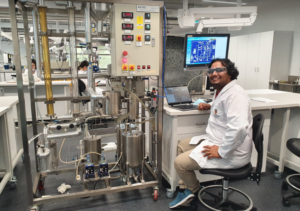The Australian Government, through Australia Awards, aims to enhance personal and professional connections by providing the opportunity for scholars to develop a deeper understanding of Australia’s values and technical expertise.
In this interview, Rishav Prasad, who studied a Bachelor of Engineering degree at the University of New South Wales, talks about his academic journey and extracurricular activities that have him build relationships, networks and professional links with the Australian community, alongside fellow international students.
- What originally motivated you to undertake Bachelor of Engineering – Chemical Engineering?
After doing science in high school, I was motivated to enter a field that involved scientific innovation, environmental sustainability, and climate action. Engineering presented as the perfect mix– and chemical engineering provided a broad range of skills in sustainable development. - Tell us about your study experience at the University of New South Wales (UNSW)?
In one word – transformative. My four years at UNSW have been truly amazing. I appreciate the overall learning and broad applications of the chemical engineering degree. Not to mention, UNSW is renowned for having (arguably) the best student-life experience among all Australian universities.
- Have you participated in any extracurricular activities at your university or elsewhere?
I have participated in various co-curricular and extra-curricular activities Below are some examples (click here for full list):
- Partnerships Director with Enactus UNSW (2021- 2022) – The program enables students to create social impact projects targeting certain UN Sustainable Development Goals. I was one of the speakers for the national competition, and UNSW placed 2nd out of the 22 participating Australian universities.
- Tutor for the School of Computer Science at UNSW (2020- 2022) – While I aspire to be an engineer, I’ve enjoyed teaching at UNSW. I have tutored over 300 students over 8 trimesters.
- Operations Team Lead, RiceCycle (2019-2022) is a student-led project under the UNSW’s Faculty of Engineering. The project works with rural farmers in countries like Uganda and Myanmar to help use farming waste for energy production.
- Undergraduate Consultant at E3 Advisory (current), this experience focuses on the project management of large infrastructure projects in Australia and New Zealand.
- Environmental Consulting Intern at MRA Consulting, this industry placement provided me with relevant professional networks and learning from their strategy team.
- Why do you think these extracurricular activities are important?
These types of activities broaden your perspective, and help you develop essential skills (soft-skills and professional). You gain experience by experimenting and trying new things, meeting industry professionals and building professional relationships, as well as making connections with student organisations and societies. I personally believe that your growth is heavily influenced by the people you choose to surround yourself with. Through extracurriculars, you will not only find like-minded people who share the same interests, but these people will most likely have similar career/life goals as you. Being surrounded by such people is a good way to stay motivated. Similarly, student organisations/societies allow you to explore the local culture and social lifestyle.
- What personal or professional linkages have you developed in Australia and why do you think it is important?
I have built connections with engineering and consulting firms including in the scientific innovation field. For instance, the MRA consulting internship, I learned about environmental policies of local municipal councils in Australia (there’s over 500). This gave me a unique point of reference as to how Fiji can grow its local government environmental activities. These connections help us as Australia Awards scholars to better visualise the improvements and positive changes we can make back home.
- What advice do you have for current or future scholars regarding the Australian learning experience, making connections, as well as engaging in other enrichment programs?
As Australia Awards scholars, we receive a unique amount of support that university students rarely get. We are able to focus on our growth (personal and professional). I encourage scholars to make the most of it, by learning about the different opportunities that are best suited for your career path in Fiji.
- After completing your studies, where do you hope to work, and what ways do you think you can contribute to Fiji’s environment sector?
In the immediate future, I hope to work in Fiji’s water or food industry. This is because I hope to immediately apply skills I learned from this program and gain professional experience as a chemical engineer. In the long-term, in light of the current climate crisis, I would like to transition to a field where I can directly contribute towards sustainable and environmentally conscious development.
- What new innovations have you discovered through your studies that you think will help you bring changes/improvements to the environment sector?
- Recycling technologies – due to Fiji’s growing urban population, our waste production may pose a bigger risk to our environment. While we have products made of recyclable materials, most do not get recycled due to contamination from other non-recyclable materials. We need to introduce recycling technologies which can support waste reduction.
- Plastic pollution – look into plastic packaging alternatives and change our disposal processes noting our high plastic usage which endangers our marine/coastal ecosystems. For instance, cellulose-based plastics can be used for many types of food storage. They just need to be researched and modified to suit Fiji’s climate.
- Energy storage – Fiji has potential to maximise its renewable energy dependency through various newly researched grid storage alternatives.
Through one of my internships at an environmental consulting firm, I have gained insights into the impact of environmental policy on the implementation of engineering innovations, specifically in the waste recycling and management industry.
0 Comments
Leave a comment